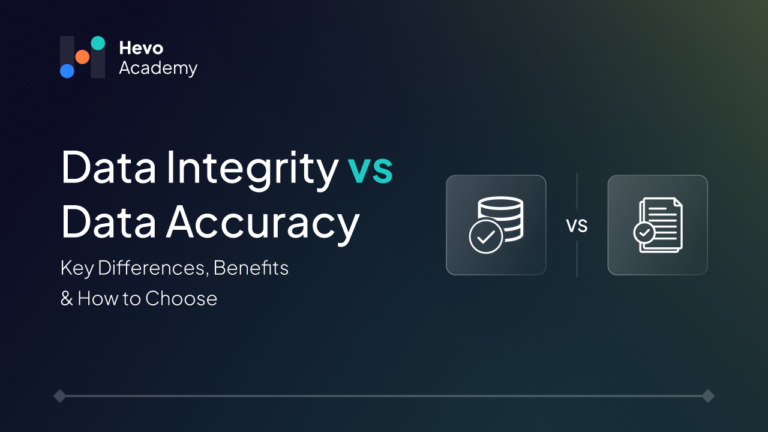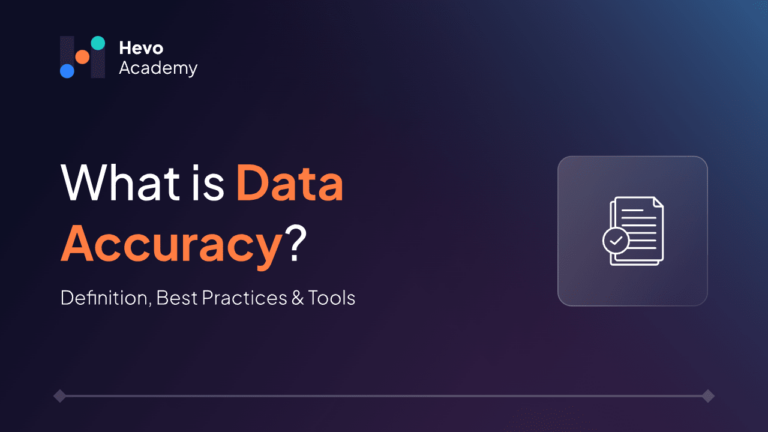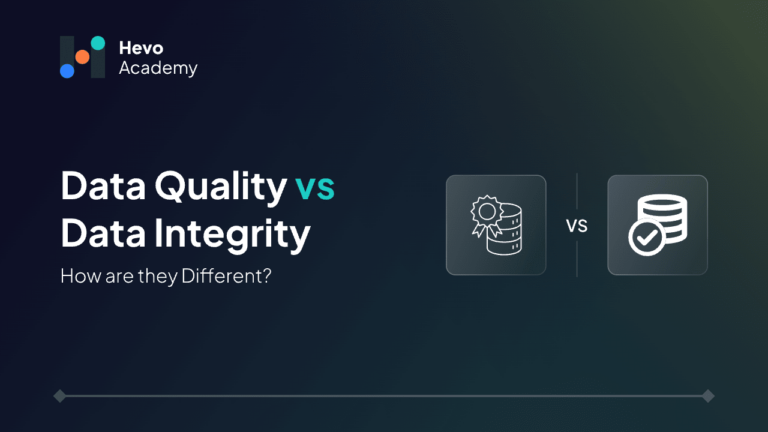It’s surprising to learn that companies can lose around $15 million each year because of poor data quality. Whether it is retail, finance, healthcare, or tech industry, data serves as the essential foundation for your operations. Poor data continues to influence our landscape. Businesses frequently underestimate the vital importance of maintaining data integrity and accuracy, which are essential for ensuring seamless operations and making informed decisions.
Table of Contents
A recent report from Gartner suggests that by 2025, 60% of businesses could face irreversible damage as a result of flawed data. We will explore data integrity vs data accuracy, the importance of maintaining data integrity and accuracy and what strategies are taken for effective maintenance within your business.
What is Data Integrity?
Data integrity is about ensuring that data remains consistent and accurate—not just for one day, week, or month, but for years. It is about ensuring that your numbers add up correctly and that they will still be correct a year later. Whether data is in storage, transit, or use, data integrity ensures it stays trustworthy and consistent.
It is like keeping a historical trail of information. It is essential to keep your archive intact and free from corruption. Businesses rely on the integrity of their data from confidential customer details to financial documentation to ensure its protection against any alterations over time.
Data integrity means protecting it from all kinds of changes, attacks, and losses, including those that happen by chance or because of system errors. It also involves ensuring data stays accurate across different systems and applications, even during transfer or processing. But don’t be confused; it is not similar to data validity. Clarifying data integrity vs data validity provides a foundation for understanding how data can maintain consistency and accuracy over time.
Keeping data integrity intact is critical to running a smooth and trustworthy operation. Here’s why:
- Better decision-making: With consistent data, you make more reliable decisions based on accurate information.
- Compliance: Data integrity helps you meet legal standards, avoiding penalties and breaches.
- Efficiency: Reduces the likelihood of operational delays caused by corrupt or incomplete data.
- Customer Trust: When customers know you handle their data properly, it boosts their confidence in your company.
For example, a well-known case of compromised data integrity occurred with Equifax in 2017. Negligent data management led to a security breach that let 147 million people’s confidential data exposed. This event hurt the company legally and financially but most importantly, it also damaged customer trust. It showed that a single minor issue with the accuracy of data could have terrible results.
Data Integrity Metrics
Businesses can figure out how their data integrity level is in a number of ways. There are several metrics that businesses can use to gauge the level of data integrity within their systems:
- Completeness
Are you accessing all parts of your data? Missing data is an indication that something has gone wrong.
- Consistency
Is the data consistent across different platforms and databases? For instance, does your sales data in your CRM match the data in your accounting software?
- Accuracy
Does the data represent real-world values correctly? For example, if you have the wrong address for a customer in your record, your shipment will end up in the wrong place.
- Validity
Does the data follow the right format and rules your system has set up? This could include making sure phone numbers are formatted correctly or that product codes follow the established pattern.
- Timeliness
Is the data up to date? Outdated data can be just as harmful as incorrect data, especially when it comes to fast-paced industries like retail or finance.
IBM did a case study on the integrity of healthcare data and found that when healthcare workers used integrity checks such as consistency and completeness audits, patient outcomes went up by 18%. This highlights how critical it is to regularly evaluate your data’s quality, especially in industries where lives can literally be at stake.
What is Data Accuracy?
Data accuracy is the degree to which data correctly reflects the real-world entities or events it’s supposed to represent. In easy words: data accuracy is the correctness of your data. We need to ensure that there are no mistakes or discrepancies in the data.
For example, you receive a random marketing email with your name misspelled by a company you subscribe to. Or you got a huge bill for something you didn’t even buy. This is a basic example of inaccurate data leading to a poor customer experience.
Data accuracy is also the basis for making choices based on data. If you don’t have it, the insights you get from analyzing data could be wrong, which could be negative for business. Your plan will not work if the numbers you use are incorrect when figuring out marketing ROI, keeping track of inventory, or predicting sales.
Why is Data Accuracy Crucial for Businesses?
This is why businesses need to be accurate:
- Clear insights
Accurate data is the basis for robust analysis. - Cost savings
Accurate data avoids mistakes that cost a lot of money that come from wrong information. - Customer happiness
Making sure that customer information is right means that customer service issues happen less frequently.
- Operational efficiency
Less time is spent fixing mistakes that happen because of incorrect data entry.
For example, Amazon uses highly accurate data about its customers and products to make its supply chain work better. They can offer fast shipping, cut costs and keep customers happy this way. Amazon’s complicated operations would not work if they didn’t have correct data. This would cause delays, higher costs, and lost business.
Data Integrity vs Data Accuracy: Key Differences
| Aspect | Data Integrity | Data Accuracy |
| Definition | Ensures that data remains consistent, reliable and trustworthy | Reflects how closely data matches real-world facts |
| Focus | Long-term consistency and trustworthiness | Correctness at the time of collection or entry |
| Scope | Includes completeness, consistency and validity | Focuses on solely on correctness |
| Impact | Ensures reliability across different systems and over time | Ensures accurate insights and analysis |
| Errors | Identifies and prevents data tampering or corruption | Focuses on avoiding input errors |
| Relation To Time | Concerned with the longevity of data reliability | Focused on the accuracy at the time of data creation |
| Example | A financial record remains consistent over time | Entering the right address when shipping a product |
Use Cases
Large multinational companies deal with millions of transactions across different regions and departments. The finance team compiles these million transactions to produce financial statements for stakeholders.
Data integrity enables consistent reporting, maintenance of historical data and enhanced data security. If there are discrepancies between the financial data in one country and the global ledger, it could lead to inaccurate reports and potential legal issues. If the data is altered due to fraud or system errors (so intentionally or unintentionally), it can severely impact trust in the company’s financial health. A breach in data integrity could mean that sensitive financial information is manipulated, leading to regulatory penalties or loss of trust among investors.
In 2001, Enron’s collapse was a classic case of data integrity issues. The company’s financial records were manipulated, which eventually led to one of the largest accounting frauds in history. This example illustrates how crucial data integrity is for maintaining trust and compliance, particularly in financial reporting.
There are many e-commerce businesses that sells products online to customers globally. The company collects data at various areas such as customer profiles and purchase histories to delivery addresses and payment information.
Amazon is a great example of a company that heavily relies on data accuracy to operate efficiently. Accurate customer data ensures smooth order processing, on-time delivery, and tailored marketing strategies. If Amazon were to handle inaccurate data, the customer experience would suffer, and its logistics would become chaotic.
Importance of Both for Business
Both data accuracy and integrity are crucial but just focusing only on one is not the best thing to do. Picture this: you have the world’s most accurate data at your fingertips, yet it deteriorates or becomes compromised as time passes. If you do your analysis on this data, the results would be inaccurate. On the other hand, adhering to data integrity without first ensuring accuracy can result in reliable but incorrect insights. Hence, if we take both of these concepts together, accuracy and integrity ensure data remains reliable from the instant it’s captured to the point it’s used for making choices.
For companies, integrating both data integrity and accuracy leads to more intelligent, quicker, and better-informed decisions. Focusing solely on one aspect can lead to decisions based in either outdated or inaccurate information. Lack in data integrity will lead to bad results. Lack in data accuracy will lead to bad insights. Moreover, to ensure data reliability and validity, it’s critical to maintain data integrity, as both reliability and validity support the goal of delivering accurate, trustworthy data. A recent report from Experian revealed that a significant 69% of businesses face challenges when it comes to making decisions based on inaccurate data. Maintaining integrity and accuracy will steer clear of this problem, resulting in optimised operational results.
Best Practices to Ensure Data Integrity and Accuracy
To make sure your data stays both accurate and reliable, follow these best practices:
- Perform regular data audits: Frequent checks can catch inconsistencies or inaccuracies early before they cause bigger problems.
- Implement data validation: Build systems that automatically verify the data’s correctness as it’s being entered. This will help you catch errors in real-time.
- Restrict access: Limit who can modify data. By controlling who has access, you reduce the risk of accidental or malicious tampering.
- Use automated tools for data cleansing: Modern data management tools can flag and correct inaccuracies before propagating through your system.
- Back up your data frequently: In case of a system failure or cyberattack, having recent backups ensures you can recover accurate, untampered data.
- Distinguishing between data reliability and data validity helps organizations focus on accuracy, as reliable data must consistently reflect true values and valid data must align with real-world standards.
One significant example is from Microsoft. It has implemented automation in every pipeline including data validation in its global supply chain. Microsoft achieved remarkable results which included a great reduction in errors, streamlined operations and significant savings in operational costs amounting to millions.
Conclusion
Data integrity and accuracy are two pillars that build the foundation of reliability of data. Businesses need to implement both of these aspects in order to trust their data. Together, they protect you from costly errors, enhance operational efficiency and enable you to make smarter decisions. Neglecting either one can leave you vulnerable to faulty conclusions, lost profits and damaged customer trust. Businesses can ensure long-term success by using best practices, which preserve data quality and integrity.
Hevo Data is one of the best data integration and transformation tools that automates the integration process while ensuring 100% data accuracy and reliability.
Frequently Asked Questions
1. Does data integrity mean data is accurate and consistent?
No, data integrity ensures that data remains reliable and unaltered, but data accuracy focuses on whether the data correctly reflects real-world events or facts.
2. What is the difference between data integrity and data validity?
Data integrity ensures that data remains consistent and trustworthy throughout its lifecycle, while data validity refers to whether the data complies with required formats or rules.
3. What is the difference between data accuracy and data reliability?
Data accuracy refers to how correct the data is at the time of collection, while data reliability indicates whether the data remains consistent and dependable over time.





